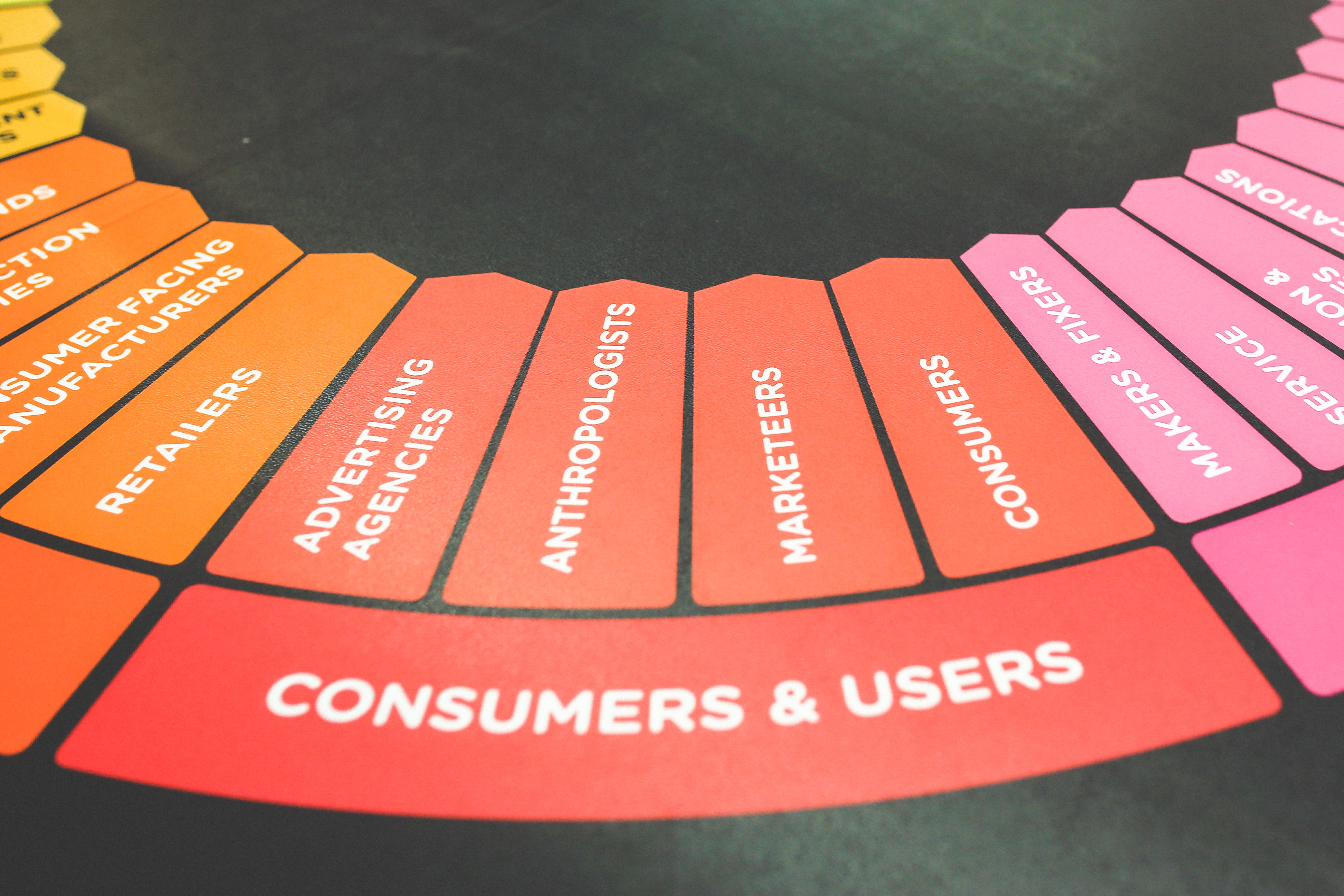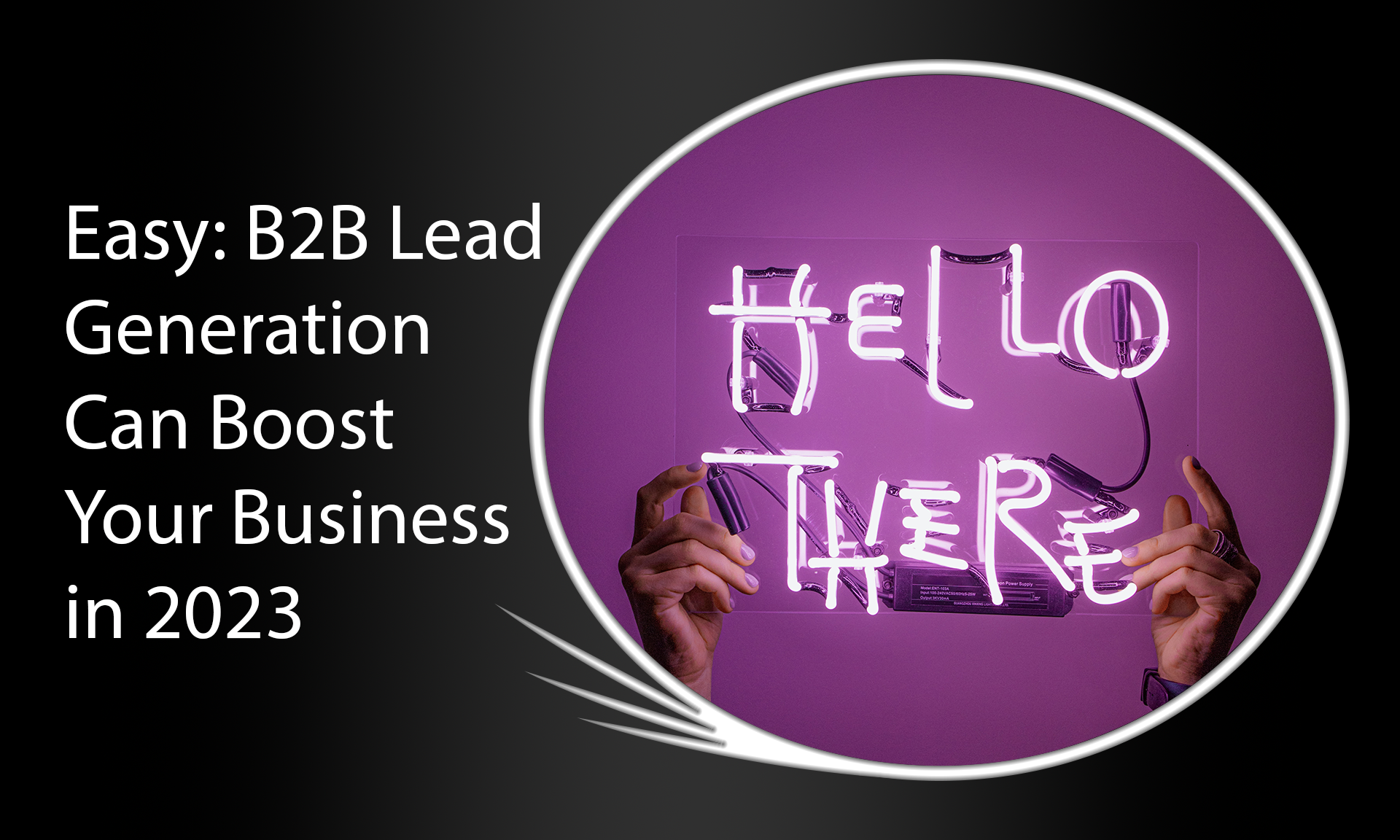In today’s highly competitive business landscape, generating leads is an essential aspect of increasing sales and improving profits. While traditional marketing approaches such as cold calling and direct mail may still have a place in the marketing mix, B2B lead generation can provide a more targeted and cost-effective solution.
By utilizing a range of digital marketing techniques and tools, B2B lead generation allows you to identify and engage potential customers in a more focused and personalized manner. In this blog post, we will explore the benefits of B2B lead generation for your business and highlight some of the key strategies that you can use to improve your results.
Understanding B2B Leads
B2B leads refer to customers, usually businesses, who may be interested in your products or services. These leads are generated through a variety of channels such as email marketing, social media, and events. It is important to understand that B2B leads are not the same as B2C leads, as the purchasing process in the B2B industry is typically longer and involves more decision-makers.
B2B lead generation is the process of identifying and attracting potential customers for your business, with the ultimate goal of converting them into paying customers. This process involves various marketing tactics, such as targeted email campaigns, advertising, and SEO. It is important to have a solid B2B lead generation strategy in place in order to increase revenue and grow your business.
To effectively generate B2B leads, it is crucial to understand your target audience and create a tailored approach. This includes identifying the pain points and challenges your potential customers face, and how your products or services can solve their problems. By providing useful and relevant information to your audience, you can foster trust and build a relationship with potential customers, ultimately leading to conversions and revenue growth for your business.

Why are B2B leads important?
B2B leads are crucial for businesses that aim to expand their customer base, generate more revenue, and increase profit margins. Leads are potential customers who have demonstrated interest in a company’s products or services and have provided their contact details for follow-up. Without leads, businesses will have a difficult time finding new customers and growing their business to its full potential.
B2B leads also help businesses target their outreach efforts more effectively. By understanding the demographics, interests, and purchasing behaviors of their target audience, businesses can tailor their marketing efforts to address specific pain points and meet the unique needs of their potential customers. This targeted approach not only increases the chances of converting leads into customers but also helps businesses save valuable marketing resources.
Moreover, B2B leads can help businesses establish long-lasting relationships with key accounts. By nurturing leads and providing them with personalized, high-quality service, companies can build trust and loyalty with their customers. This can create long-term customers who have the potential to become advocates for the company, driving more leads and business growth. Ultimately, obtaining high-quality B2B leads is vital to the success and growth of any business that wishes to thrive in today’s competitive market.
How can you generate B2B leads?
Generating B2B leads is an essential aspect of any business looking to grow. One way to generate leads is through networking events, such as conferences and trade shows. These events provide opportunities for businesses to connect with potential customers and build relationships that can lead to future deals.
Another effective method for generating B2B leads is through content marketing. By creating valuable and informative content, businesses can attract potential customers to their website and capture their contact information for future follow-up. This can include creating blog posts, e-books, whitepapers, and webinars that speak directly to the pain points and challenges that their target audience faces.
Leveraging social media is another way to generate B2B leads. By utilizing platforms such as LinkedIn, businesses can connect with potential customers and start conversations that can lead to business opportunities. Sharing valuable content and engaging with others in their industry can also help establish their credibility and increase their visibility in their target market.
What is the difference between B2B and B2C leads?
There are two main types of leads that businesses must understand: B2B and B2C leads. B2C leads refer to leads for businesses that sell directly to consumers. These businesses tend to have higher sales volumes but more competitive markets. On the other hand, B2B leads refer to leads for businesses that sell to other businesses and tend to have higher value transactions but focus on building longer-term relationships.
There are several key differences between B2B and B2C leads. First, B2C leads are often interested in lower-priced products and make quick purchasing decisions. B2B leads, however, tend to purchase higher-priced products or services and have longer sales cycles. Additionally, B2B leads may be more interested in building long-term partnerships and relationships with a business, while B2C leads may be more interested in one-time purchases and deals.
Another key difference between B2B and B2C leads is the size of the potential customer base. B2C businesses may have a larger customer base with more potential leads, while B2B businesses may have a smaller, more niche audience. However, the high value of B2B leads means that even a small number of successful conversions can bring in significant revenue for a business.
Understanding the differences between B2B and B2C leads is crucial for any business looking to succeed in lead generation. While B2C leads tend to have high sales volumes and quick turnaround times, B2B leads are often higher priced and require a longer-term approach. By tailoring their approach to their specific lead type, businesses can improve their chances of success and generate more revenue over time.

Benefits of B2B Lead Generation
B2B lead generation targets other businesses that could benefit from your product or service. It involves identifying potential customers that can be converted into sales. There are various ways to generate leads such as through newsletters, email marketing campaigns, and social media.
One of the main benefits of B2B lead generation is the ability to reach a wider audience. Traditional methods of advertising such as radio or television may not reach the specific audience that you are targeting. By using B2B lead generation, you can target a precise group of businesses that are more likely to be interested in your product or service.
Another benefit of B2B lead generation is that it can lead to more effective sales results. By targeting a specific audience, you are more likely to make sales as you are reaching out to businesses that are more likely to buy from you. Using B2B lead generation can therefore improve overall sales performance and result in higher profits for your business.
How can B2B lead generation improve your business?
B2B lead generation can improve your business in numerous ways. Firstly, it can help you to reach a wider audience and generate more leads. This will ultimately lead to more sales and increased revenue for your business.
Secondly, B2B lead generation can help to establish your business as an industry leader. By consistently generating high-quality leads, you demonstrate your expertise and knowledge within your industry, making you a go-to resource for potential customers.
B2B lead generation can also help to improve the efficiency of your sales process. By targeting the right audience, you can ensure that your sales team is focusing their efforts on leads that are more likely to result in a sale, maximizing your team’s productivity and improving your overall bottom line.
Why is lead nurturing important?
Lead nurturing is an essential aspect of B2B lead generation. It involves building relationships with potential buyers who have shown interest in your company or products but are not yet ready to make a purchase. Lead nurturing helps you educate your prospects and keep your brand top-of-mind until they are ready to convert.
Lead nurturing is crucial for long-term business success. It enables you to establish trust with your prospects, which helps to strengthen your brand’s credibility and position in the industry. By providing valuable and relevant content to your leads, you can keep them engaged and interested in your brand, ultimately leading to more sales and revenue for your business.
By not implementing an effective lead nurturing strategy, you run the risk of losing potential customers to your competitors. It is estimated that only 25% of leads generated are legitimate and ready to make a purchase right away, which highlights the importance of lead nurturing. Through personalized communication and targeted marketing campaigns, you can keep your leads engaged and interested in your brand, ultimately leading to more sales and revenue for your business.
What are the benefits of personalized lead generation?
Personalized lead generation is a powerful tool that helps businesses identify and target their ideal buyers. One of the biggest benefits of personalized lead generation is that it allows businesses to tailor their marketing campaigns to the specific needs and preferences of their customers. This can lead to higher conversion rates and increased customer loyalty in the long run.
Another benefit of personalized lead generation is that it helps businesses to identify high-value prospects who are more likely to make a purchase or become long-term customers. By collecting data on previous purchases and browsing behavior, businesses can gain valuable insights into the buying habits and preferences of their customers, which can inform their marketing strategies and improve their overall ROI.
Personalized lead generation also helps businesses to build stronger relationships with their customers by providing them with relevant and valuable content that speaks directly to their needs and interests. This can help to establish trust and credibility, which can in turn lead to increased conversions and a more positive brand reputation.
Overall, personalized lead generation is a critical component of any successful B2B marketing strategy. By understanding the needs and preferences of their target audience, businesses can not only improve their conversion rates and ROI, but also build stronger relationships with their customers and establish themselves as a trusted leader in their industry.

How can marketing automation help with B2B lead generation?
Marketing automation consists of tools that can help with B2B lead generation. It can automate tasks such as lead nurturing, email campaigns, and social media activity. This helps to streamline the lead generation process and increase efficiency.
One way that marketing automation can help with B2B lead generation is by tracking user behavior. It can help to identify the specific actions that a prospect takes on a website or social media page. This information can then be used to tailor lead nurturing campaigns to the specific interests and needs of the prospect.
Marketing automation can also help with lead scoring. It can assign a score to each lead based on their level of engagement and their position in the sales funnel. This helps to prioritize the most promising leads and ensure that the sales team is focusing their efforts on the most valuable prospects.
There are several available tools that can help you automate parts or all of your marketing Campaigns. Tools like Later and HootSuite can help you automate your social media posts. Email marketing tools like ConvertKit and MailChimp can help automate your email campaigns. Hubspot and SalesForce help automate your lead generation and nurturing.
Strategies for Effective B2B Lead Generation
The success of any B2B business is heavily reliant on efficient lead generation techniques. Generating leads, however, can be tricky, requiring focus, strategy, and a targeted approach. For businesses that are struggling with generating leads, there are various strategies that can be employed to enhance their lead generation efforts effectively.
First, businesses need to identify their ideal customer. Knowing your client personas as a B2B business is essential in developing a marketing strategy that will resonate with your target audience. Adequate research into target demographics, purchasing habits, and challenges will allow businesses to tailor their messaging, and hence reach potential customers in a more effective manner.
Secondly, social media is an excellent lead generation tool for B2B businesses, and companies that employ social media marketing typically achieve higher success rates than businesses that don’t. Posting targeted content on different social media platforms will help your business attract potential customers. For example, LinkedIn provides a more professional atmosphere and is an ideal platform for B2B businesses.
Lastly, customer referrals are a cost-effective way to increase leads. Referrals are usually people who already trust your product or service and, therefore, are more likely to purchase from you. Offering rewards incentivizes customers to refer more people, and positive feedback from close friends or colleagues can convert potential customers into paying clients.
Ultimately, effective B2B lead generation strategies require a focused, targeted approach that resonates with the target audience. Businesses that invest in developing a marketing strategy that addresses the unique needs of their potential clients and continually refine their approach can significantly improve their lead generation efforts, leading to improved sales conversions and overall success.
What are the best B2B lead generation tactics?
One of the most important aspects of B2B lead generation is choosing the right tactics. Some of the most effective methods include personalized email campaigns, targeted content marketing, and social media outreach. Personalized email campaigns can be tailored to specific audiences and offer valuable insights or promotions. Targeted content marketing involves creating content that resonates with your target audience and fits their needs and pain points while utilizing SEO optimization. Social media outreach involves building relationships and engaging with potential customers through professional networking platforms such as LinkedIn.
One effective B2B lead generation tactic is to utilize account-based marketing strategies. This approach allows businesses to focus on high-value accounts and create customized, highly-targeted campaigns that speak directly to those businesses’ needs and challenges. Another effective tactic is hosting webinars or other virtual events that allow businesses to showcase their expertise and interact with potential clients. These events can help build trust with potential customers and establish a strong brand reputation.
It’s important to remember that effective B2B lead generation often involves a combination of tactics that work together to create a cohesive approach. By combining tactics such as targeted social media outreach, personalized email campaigns, and account-based marketing, businesses can create a comprehensive B2B lead generation strategy that helps them reach their goals and grow their business. With the right combination of tactics, businesses can reach new audiences, build strong relationships with potential clients, and ultimately, drive more sales and revenue.

What is the importance of creating a targeted customer profile?
Creating a targeted customer profile is essential for any successful B2B lead generation strategy. Knowing who your ideal customer is will help you customize your marketing message and reach those who are most likely to buy from you. By understanding your audience, you can tailor your marketing efforts to their specific needs and pain points, resulting in higher quality leads.
One of the main benefits of creating a targeted customer profile is that it will help you save time and money. When you know exactly who your ideal customer is, you can focus your efforts on the channels and tactics that are most likely to resonate with them. This means you won’t waste resources on marketing to people who are unlikely to be interested in your products or services.
A targeted customer profile also helps you to craft a more effective marketing message. By understanding your audience’s pain points and motivations, you can create messaging that speaks directly to their needs and desires. This can help to build trust and credibility, and increase the chances that they will convert into a lead or customer.
What are some effective ways to use social media for B2B lead generation?
One effective way to use social media for B2B lead generation is to identify and engage with industry influencers who can amplify your message and increase visibility to your target audience.
Using social media to provide valuable content, such as industry news or thought leadership articles, can help position your brand as a trusted source and generate interest and engagement from potential leads.
Leveraging social media advertising tools, such as targeting specific job titles or industries, can help ensure your content and messaging is reaching the right audience and driving conversions.
What is the role of email marketing in B2B lead generation?
Email marketing is a vital strategy for B2B lead generation, as it allows businesses to nurture relationships with potential customers and keep them engaged with their brand. Through targeted email campaigns, B2B businesses can communicate their value proposition, offer valuable content, and promote their products and services to a receptive audience. In fact, according to HubSpot, email marketing has an ROI of 3800%, making it one of the most cost-effective ways to generate leads.
One of the primary benefits of email marketing in B2B lead generation is that it allows businesses to reach a large audience with minimal effort. By building an opt-in list of subscribers through website sign-ups, conferences, or social media, businesses can send targeted campaigns to individuals who have already expressed an interest in their brand. This can lead to higher open and click-through rates, as well as a greater likelihood of converting leads into customers.
Moreover, email marketing can be used throughout the entire B2B sales funnel, from lead generation to customer retention. For instance, businesses can send educational content and product updates to leads to nurture relationships and move them closer to a sale. Additionally, once a conversion has been made, businesses can use email to upsell or cross-sell products and encourage customer advocacy. This creates a seamless customer experience that can lead to increased brand loyalty and repeat purchases.
Email marketing plays a critical role in B2B lead generation, as it provides a cost-effective channel for businesses to nurture relationships with potential customers and encourage them to take action. By leveraging targeted email campaigns, B2B businesses can communicate their value proposition, stay top of mind with their audience, and move leads through the sales funnel. When combined with other effective lead generation strategies, email marketing can help businesses gain a competitive edge and drive long-term growth.

Measuring B2B Lead Generation Success
One of the biggest concerns of businesses when it comes to B2B lead generation is measuring its success. In order to ensure that your efforts are not going in vain, it is important to have a clear understanding of how you will measure success. The success of your B2B lead generation efforts can be determined using a number of metrics that are unique to your business.
One of the primary metrics to measure success is the number of leads generated. It is important to track the number of leads generated to determine the effectiveness of your B2B lead generation efforts. In addition, you also need to analyze the lead quality to ensure that you are targeting the right audience and generating leads that have a higher potential of converting into paying customers.
Another important metric to measure success is the conversion rate. This metric tracks the number of leads that actually convert into paying customers. It is important to track this metric to ensure that you are generating high-quality leads that have a higher potential of converting into customers. In order to improve your B2B lead generation efforts, you need to identify the factors that are impacting your conversion rate and take the necessary steps to improve it.
What are the key metrics for measuring B2B lead generation success?
Successful B2B lead generation can be measured by a variety of key metrics. One important metric is conversion rate, which represents the percentage of website visitors who become leads. This measures the effectiveness of the lead capture process and helps determine if marketing efforts are reaching the right audience.
Another key metric is lead quality, which looks at the value of leads generated. This metric considers factors such as job title, company size, and industry, as well as whether the lead is a decision-maker or has purchasing authority. High-quality leads are more likely to result in sales and revenue growth.
Return on investment (ROI) is an essential metric for measuring B2B lead generation success. ROI measures the revenue generated from lead generation efforts compared to the cost of those efforts. A positive ROI indicates a successful campaign, while a negative ROI may indicate the need for changes in strategy or targeting. Overall, monitoring key metrics is vital to understanding the effectiveness of B2B lead generation and making data-driven decisions to optimize results.
How can you analyze your lead generation data?
One of the most crucial steps in measuring success in B2B lead generation is effectively analyzing your lead generation data. The following are some ways to understand how to do that.
First and foremost, use the right metrics to evaluate your lead generation data. Keep track of metrics like lead conversion rate, cost per lead, and lead acquisition, to get a broad understanding of how effectively your B2B marketing efforts are working.
In addition to using metrics, it’s essential to track your leads’ behavior on your website and social media. This lets you know which channels your customers spend time on and how they consume information. It’s also necessary to create user personas and customer segments to better understand your customers and align your marketing efforts with the customer’s interests.
Using marketing automation tools like email marketing and lead scoring, can help you be more effective in tracking your leads, in identifying which leads are most likely to convert, and in nurturing leads until they are sales-ready. Analyzing your lead generation data can help you identify areas for improvement, scale your marketing efforts and help you win more business and attract new customers.
What are some ways to optimize your B2B lead generation strategy?
Optimizing your B2B lead generation strategy is crucial in achieving success and growth in your business. One way to do this is by creating targeted content that speaks directly to your ideal customers. This content needs to provide value and address their pain points, which will increase the likelihood of them engaging with your business.
Another way to optimize your strategy is by utilizing multiple channels to reach your target audience. This can include social media, email marketing, and targeted advertising. By diversifying your approach, you increase your chances of reaching a wider audience and generating more leads for your business, which can make you more money.
It’s important to track and analyze the results of your B2B lead generation efforts. This includes measuring conversion rates and understanding which channels and content are most effective in generating leads for your business. Armed with this information, you can adjust your strategy accordingly to maximize results and achieve success in your B2B lead generation efforts.
How can you continuously improve your B2B lead generation efforts?
One way to continuously improve your B2B lead generation efforts is to regularly review and analyze your data. Look at your conversion rates, lead sources, and other metrics to identify areas where you can improve.
Another strategy is to regularly test and tweak your lead generation tactics. A/B testing different ads, landing pages, and email campaigns can help you determine what works best for your target audience.
Also, consider partnering with other businesses or industry influencers to expand your reach and generate more leads. Collaborating with others can help you tap into new audiences and provide valuable social proof for your products or services.
To Summarize
In today’s competitive business world, generating B2B leads can be a game-changer for your company. Understanding your target audience and creating effective lead generation strategies are the keys to achieving success. With the right approach and tools, you can reach the right people and create meaningful relationships that can lead to increased sales and business growth.
B2B lead generation offers many benefits, including increased brand awareness, improved customer engagement, and higher revenue. By taking the time to develop a comprehensive strategy tailored to your business goals, you can achieve these benefits. Measuring the success of your lead generation efforts is also crucial to ensuring that you are targeting the right people and maximizing your efforts.
B2B lead generation is an essential part of any successful business. With the right understanding of your audience and effective strategies in place, you can generate high-quality leads and increase revenue. Measuring success plays a vital role in determining the effectiveness of your approach and whether any adjustments need to be made. Start implementing these strategies today and see the difference it can make for your business.

